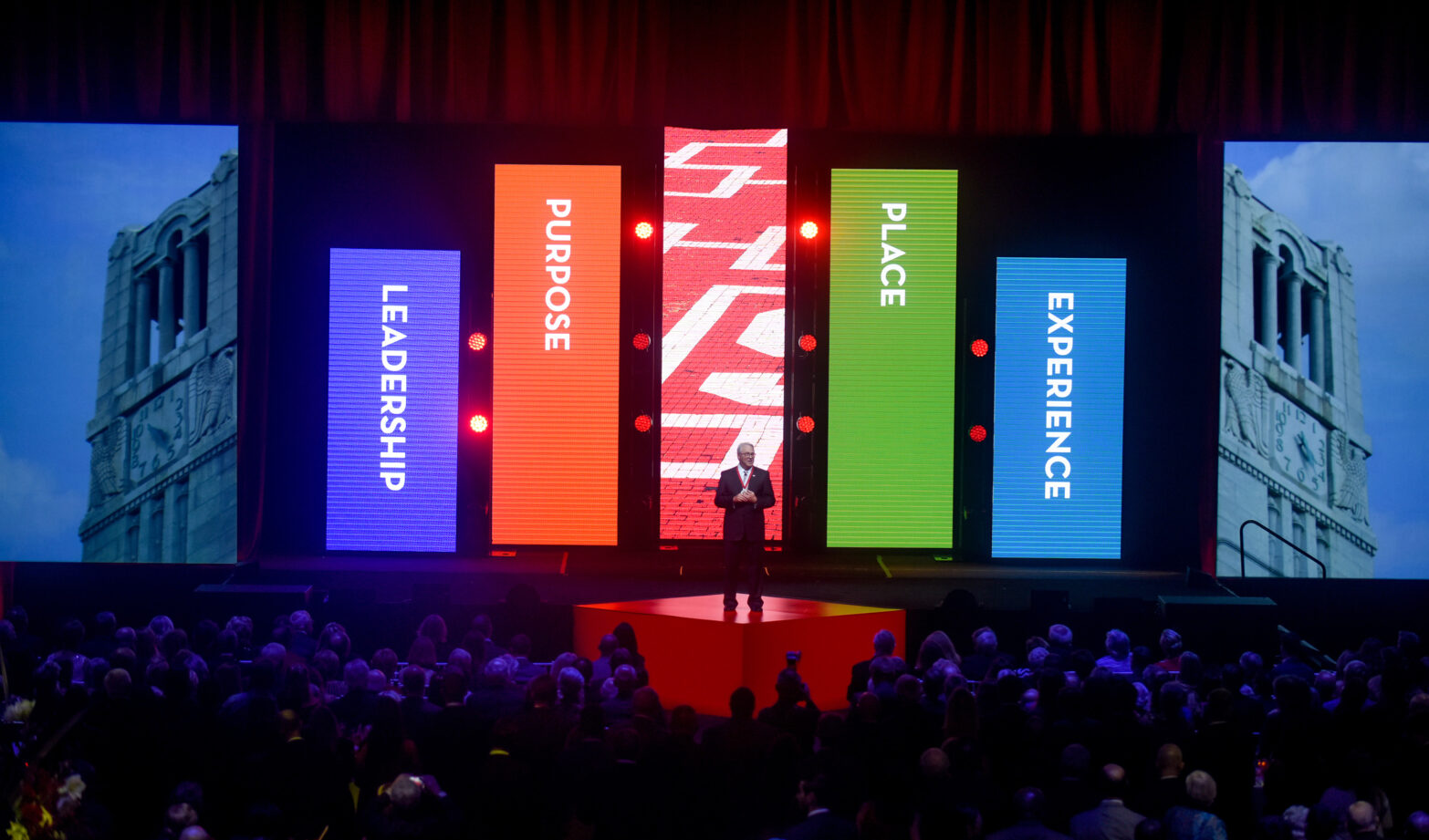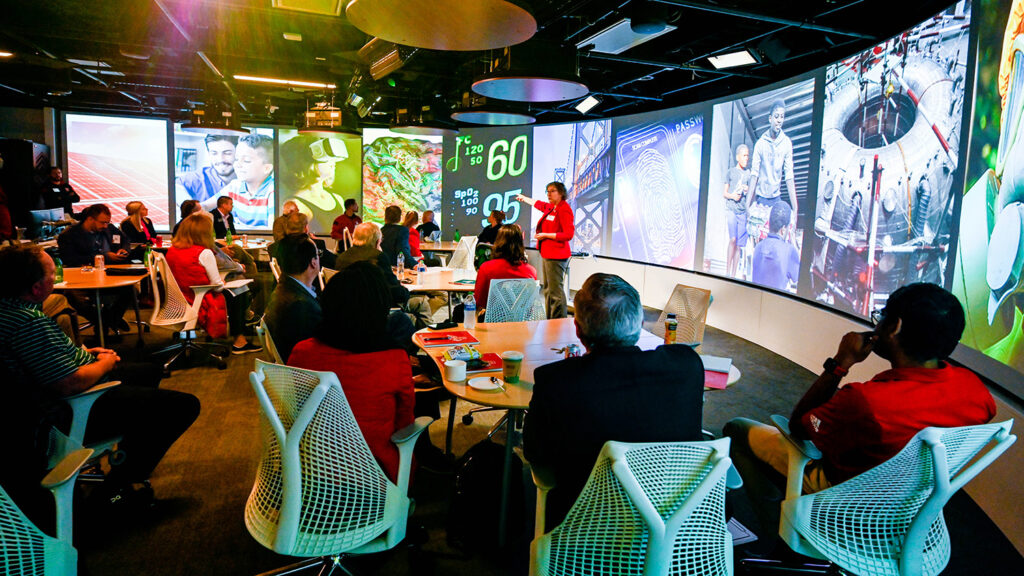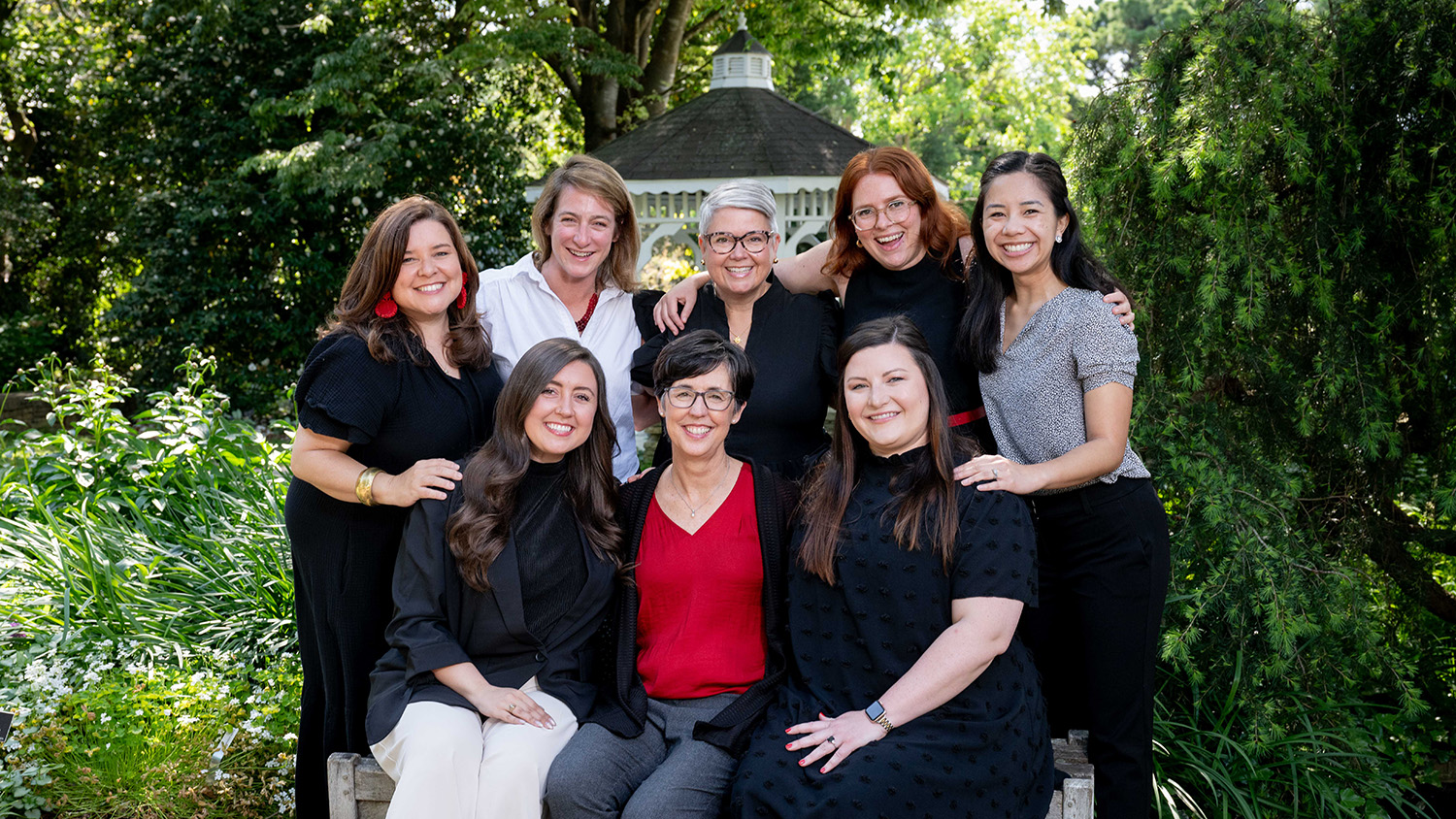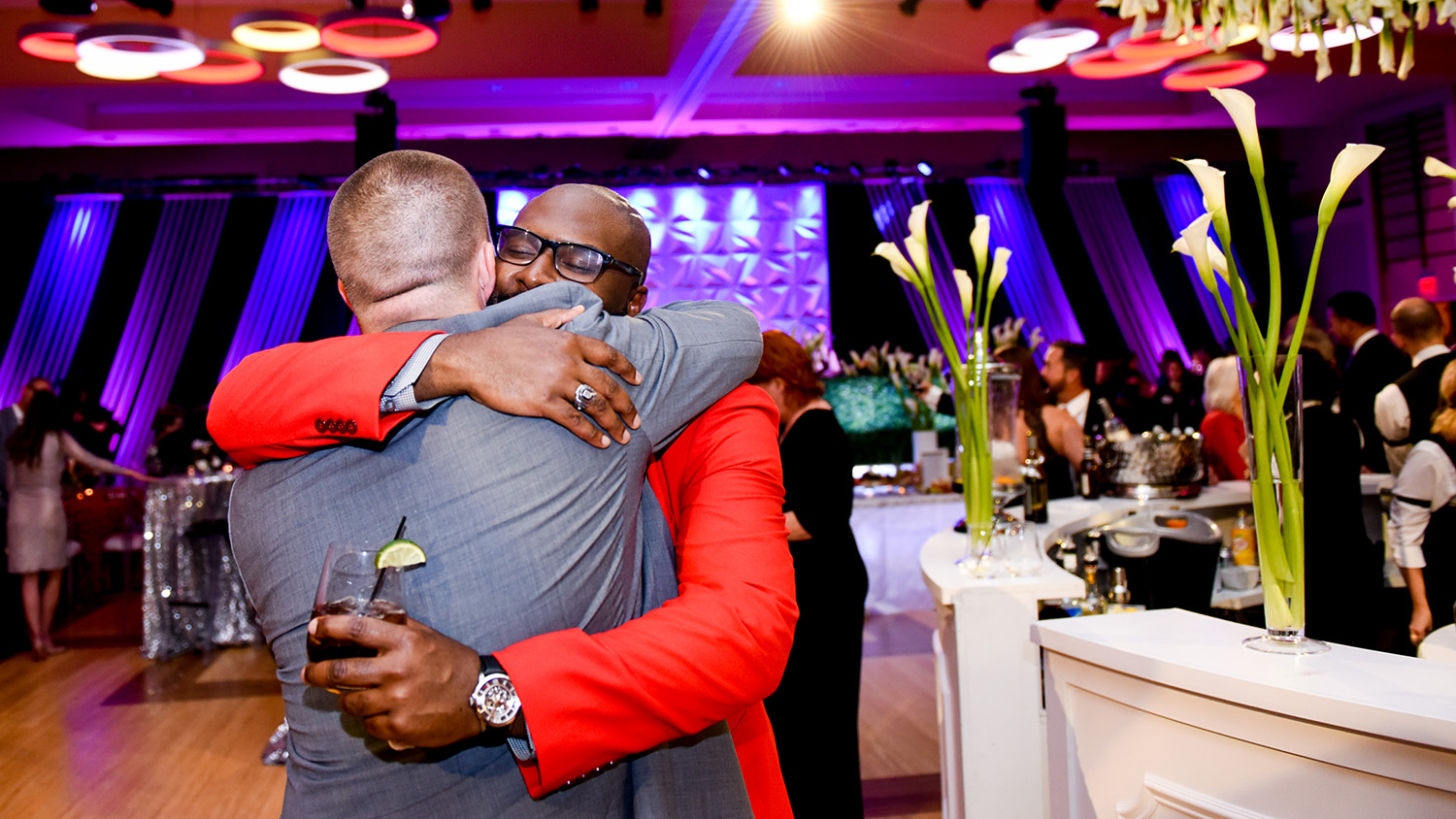
Plan an Event
Whether you're working with us to create a university-level extravaganza or planning your own event for a unit, we've got all the guidance and resources you need to get started.
Planning an Event at NC State
University Special Events and Experiences is the guiding presence behind event planning at NC State. We both lead the creation of the university’s signature events and empower NC State employees to plan and execute their own events, where appropriate.
Using the resources below, you can determine the role University Special Events and Experiences should play in an upcoming celebration or in-person experience — and tap our wealth of knowledge about planning any event, big or small, on behalf of a unit or department.
Event Tiers
NC State events fall into three tiers according to their scale, strategic significance and degree of leadership involvement. These tiers also determine how involved we will be in leading the event planning process and bringing your event to life.
Tier I Events
These are events where:
- The chancellor is the primary host;
- the audience is universitywide or includes key leadership; or
- the event is hosted by a top-level administrator and has a direct connection to a university strategic priority.
For tier I events, University Special Events and Experiences will serve as the chief planner. A principal event planner will be assigned to this event. In addition to managing the tasks as defined on the tier I checklist, our planner will:
- Draft a creative brief for approvals
- Conduct planning meetings
- Assign roles and responsibilities
- Work with paying department to establish the event budget
- Work cooperatively with the appropriate colleges or units to define target audiences, invitation lists, messaging, outcomes and follow-up methods
- Be the primary contact for scheduling, managing, and execution of the event.
Tier II Events
These are events where:
- A dean or department head is the primary host;
- the chancellor is involved in the event program, but is not the primary host; and
- the invitation list does not include key leadership.
For tier II events, University Special Events and Experiences will serve as a consultant for the event planning process. A principal event planner will be assigned to this event. In this capacity, our planner will:
- Provide key process advice
- Advise on a creative brief
- Be appointed to any event committee or planning group
- Assist with chancellor participation, key leadership involvement, handling certain guest lists and other checklist items as assigned
- Serve as a liaison to the Office of the Chancellor
Tier III Events
These are events where:
- The event is sponsored by a college department; and
- the event is targeted for specific departments or units.
For tier III events, University Special Events and Experiences will not be involved in the event planning process. The hosting college or unit should refer to the checklist and other resources below as they plan their event.
Planning Your Event
Refer to the Checklist and Timeline as a guide to help plan your event.
Checklist and Timeline
Four to five months before the event:
- Establish a planning group and appoint a chair.
- Initiate event planning and establish all responsibilities.
- Reserve the event date (or dates) on key attendees’ calendars.
- Determine and reserve the venue.
- Determine the funding and budget sources.
- Contact us if you are planning a Tier 1 or Tier 2 event.
Three to four months before the event:
- Initiate program discussion.
- Determine the guest list and create a guest list database.
- Design save-the-date cards.
- Determine the need for mementos.
- Create invitations or RSVPs and obtain approvals.
- Reserve parking for VIPs and establish a plan for VIP seating.
- Block hotel rooms for out-of-town guests.
Two to three months before the event:
- Confirm speakers and learn their presentation needs.
- Develop a draft of the program.
- Contact University Communications and Marketing about internal and external publicity.
- Determine the precise areas at the venue for any stages or seating.
- Determine event signage requirements (pedestrian and vehicle).
- Determine onsite registration procedures, including ushers.
- Book caterers and establish a preliminary menu and budget.
- Contact NC State Transportation for parking assistance.
- Contact NC State University Police for safety and security review.
- Contact NC State University Fleet Services for any bus or car transportation.
- Contact vendors (as required) for tent, stage, podium, chairs, tables, electronics (such as sound system, lighting, LCD projector, DVD player, laptop), flowers, plants, balloons, other decorations and mementos.
- Email save-the-date.
- Begin design of mementos.
Six to eight weeks before the event:
- If alcohol is being served, request necessary campus approvals and state permits.
- Place order for invitations and RSVPs.
- Send invitations.
- Order mementos.
Four weeks before the event:
- Approve the final program.
- Draft scripts or talking points for speakers.
- Work with University Communications and Marketing on copy for internal and external news releases.
- Meet with vendors on site.
- Consider site preparation (special cleaning, equipment and trash removal).
- Prepare event signage.
Two weeks before the event:
- Review the planning group and staffing assignments for the day (or days) of the event.
- Meet on site with operational staff, such as transportation officials and ushers, to discuss responsibilities.
- Meet with caterers on site to discuss setup and final menu.
One week before the event:
- Send caterer the final count (catering deadlines may vary).
- Print programs, name badges and seating cards for VIPs.
- Confirm arrangements with vendors.
One day before the event:
- Contact caterer to verify all arrangements.
- Confirm security requirements.
- Ensure that tent, chairs, tables, stage, podium are in place.
Day of the event:
- Check location setup to include chairs, tables, podium, food.
- Arrange printed material, name tags, mementos, etc. on registration table.
- Check sound and lighting equipment with any vendors.
- Ensure that space and connectivity are available for any attending media.
- Ensure that decorations are in place.
- Place water at podium for speakers.
One to five days after the event:
- Write thank you notes to speakers, volunteers, staff and others as appropriate
- Complete a written evaluation of the event with suggestions for future events
- Coordinate event story and photographs with University Communications and Marketing
Expand each topic below for more detailed guidance.
Planning Group
- Establish a planning group composed of major stakeholders, and designate a chair.
- The planning group should include those who can best address the necessary tasks, which include:
- Program
- Funding and budget
- Invitations and RSVPs
- Protocol
- Venue
- Signage
- Reception
Funding and Budget
- Determine who is paying for the event.
- If the university, identify the unit(s) and contact them.
- If an outside source, identify the organization and contact them.
- If it’s a combination of both, determine who has approval authority for expenditures.
- Prepare a budget spreadsheet and consider expenses:
- Printed materials such as invitations, RSVP cards or programs
- Postage
- Mementos
- Travel expenses for speaker(s)
- Signage
- Catering
- Photographer
- Tent, stage, podium, chairs, tables, lighting
- Electronics such as sound system, LCD projector, DVD, laptop
- Flowers, plants, balloons or other decor
- Security
- Ceremonial items, such as shovels and hard hats with insignia for groundbreakings, or ribbons and scissors for ribbon-cutting events
- Room rental
- Production company fees
Venue
- Determine a venue.
- Complete signing of contracts with the venue.
- At least three months prior to the event, determine the precise area for setup to include stage, general seating, VIP seating, media location and registration table.
- Determine onsite registration procedures.
- Determine the number and type of volunteers needed — students, faculty, staff and others.
- Determine event signage and stage backdrop, if needed.
- Contact NC State Transportation for traffic control and parking.
- Contact NC State University Police well in advance to arrange for safety and security needs and to discuss issues related to VIP attendance.
- Secure transportation and parking needs of VIPs or speaker, as well as transportation and parking of guests.
- Contact vendor(s) for tent, stage, podium, chairs, tables and tablecloths.
- Contact vendor(s) for electronics such as sound system, lighting, LCD projector, DVD and laptop.
- Contact vendor(s) for flowers, plants, balloons and other decorations.
- Determine need for ceremonial items such as shovels, hard hats, ribbons or scissors.
- If necessary, determine insignias for podium, hard hats and shovels.
- Make arrangements for site preparation (e.g., special cleaning, equipment and trash removal).
- Arrange for seating of VIPs and other special guests or speakers.
Food and Beverages
- Determine the precise location where food and beverage service will take place.
- At least two months prior to the event, contact Rave! Catering — or, where allowed, outside caterers — to review the vendor’s catering menu and determine the approximate cost for your event.
- One month prior to the event, meet with the caterer on site to discuss setup and determine what food and beverages will be served.
- At least one week prior to the event, send your final guest count to the caterer (this deadline may vary based on the caterer).
- Contact the caterer one day prior to the event to verify all arrangements.
- If alcohol is to be served, read and follow the university’s alcohol regulation.
Invitations and RSVPs
- The style of the invitation should indicate the nature of the event, such as whether it’s formal or casual.
- The invitation should tell invitees the who, what, why, when and where of the event.
- Include the following:
- Host name(s)
- Date and time
- Address
- Directions (include a small map, if possible)
- Parking information
- A space for invitees to note dietary restrictions
- If the chancellor’s name is on the invitation, or if the chancellor has a significant role in the event, obtain approval from the Office of the Chancellor before sending the invitations.
- Use logos and wordmarks in accordance with the NC State brand.
- Contact University Communications and Marketing or an outside design firm for assistance with designing invitations and RSVPs.
- Create a guest list database, paying attention to special invitees such as elected officials, the UNC System president and Board of Governors, the NC State Board of Trustees and Board of Visitors, and other NC State board members. In the case of groundbreakings and dedications, consider inviting architects and building contractors.
- Set a response deadline of at least 10 days prior to the event.
- Consider whether you want acceptance-only responses.
- Enclose an RSVP with a postage-paid return envelope.
- Order invitations or RSVPs six to eight weeks prior to the event.
- Mail invitations or RSVPs four to six weeks prior to the event.
- Establish a voice mailbox to acknowledge receipt after hours.
- Return acknowledgement should be made, so designate a contact person and email address for responses.
Program
- Three to four months prior to the event, determine the event’s purpose, goal and audience.
- Two to three months prior to the event, identify event activities and the order of the program. If the chancellor will be involved, the Office of the Chancellor will approve the scope and order of the final program.
- Determine how many speakers you’ll have and the order in which they’ll speak.
- Speaker order depends upon the event and is determined by protocol.
- Write a script or talking points for your host(s).
- If the chancellor is a speaker at your event, provide suggested talking points and the program order to the Office of the Chancellor at least two weeks prior to the event.
- Arrange for University Communications and Marketing or an outside designer to design the printed program. Consider using the same designer that created the invitations to ensure a consistent look across all event materials.
- Four weeks prior to the event, approve the final program.
- Wait to print the program until one week prior to the event, to allow for last-minute changes.
University Advancement Events Calendar (Login Required)
- For details on upcoming University Advancement events or to add your upcoming event, visit the University Advancement Events Calendar.
Forms and Regulations
Alcohol Regulation
Fundraising and Political Events
Letterhead and Branding
Tax Exemption

Campus Resources
A wide variety of NC State units are available to help you plan an NC State event on campus. Below, you can find the contact information for some of these key partners or resources.
Campus Catering and Spaces
- Rave! Catering
- Campus Enterprises
- Talley Student Union and Other Student Centers Spaces
- McKimmon Conference and Training Center
- Park Alumni Center
- Centennial Campus Outdoor Spaces
- Lonnie Poole Golf Course
- Hunt Library
- D.H.Hill Library
Design and Marketing
- For invitations, programs, print material, photography, videography and more, contact the executive director of marketing for University Communications and Marketing: 919-513-3240
Media and Publicity
- Contact the director of strategic communications and media relations for University Communications and Marketing: 919-515-8387
Protocol
- To schedule the chancellor or provost for an event, submit a leadership attendance request form.
- To talk through protocols for internal affairs, contact the assistant vice chancellor for University Special Events and Experiences: 919-515-7184
- To talk through protocols for governmental affairs, contact External Affairs, Partnerships and Economic Development: 919-515-9340
- To talk through protocols for the UNC Board of Governors and NC State Board of Trustees, contact the Office of the Chancellor: 919-515-2191

